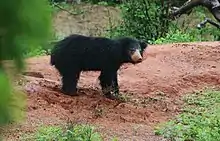Sri Lankan sloth bear
The Sri Lankan sloth bear (Melursus ursinus inornatus)[2] is a subspecies of the sloth bear which is found mainly in lowland dry forests in the island of Sri Lanka.
| Sri Lankan sloth bear | |
|---|---|
.jpg.webp) | |
| At a small waterhole at sunset in Yala National Park, Sri Lanka | |
| Scientific classification | |
| Kingdom: | Animalia |
| Phylum: | Chordata |
| Class: | Mammalia |
| Order: | Carnivora |
| Family: | Ursidae |
| Genus: | Melursus |
| Species: | |
| Subspecies: | M. u. inornatus |
| Trinomial name | |
| Melursus ursinus inornatus Pucheran, 1855 [1] | |
Ecology
Being omnivorous, it feeds on nuts, berries, and roots, as well as carrion and meat. One of its main staples is insects, which it removes from rotting stumps and trees with its long, hairless snout. Otherwise, it rarely kills animals. The sloth bear is sympatric with the leopard.[3][4]
Conservation status

The Sri Lankan sloth bear is highly threatened, with a population less than 1000 (the wild population may be as few as 500) in many isolated populations with population decrease. Destruction of dry-zone natural forest is its main threat because unlike other large Sri Lankan animals, the Sri Lankan sloth bear is highly dependent on natural forests for its food source.
Cultural significance
In its native habitat of Sri Lanka, this bear is called the walaha in Sinhalese and karadi in Tamil.[5] Both terms simply translate to "bear" in English.
See also
References
- Revue et Magasin de Zoologie [1855] 7 (3): 392 (J. Pucheran)
- Pucheran, J., Revue et Magasin de Zoologie (in French), 7, p. 392
- Barbara Hadley (21 December 2008), The Sloth Bear (PDF), Bear Specialist Group, archived from the original (PDF) on 21 December 2008
- Brown, G. (1993). The Great Bear Almanac. Lyons & Burford. ISBN 1558212108.
- "International Animal Rescue: Saving animals from suffering around the world" (PDF). International Animal Rescue. Retrieved 28 November 2009.
External links
| Wikimedia Commons has media related to Melursus ursinus inornatus. |
| Wikispecies has information related to Melursus ursinus inornatus. |